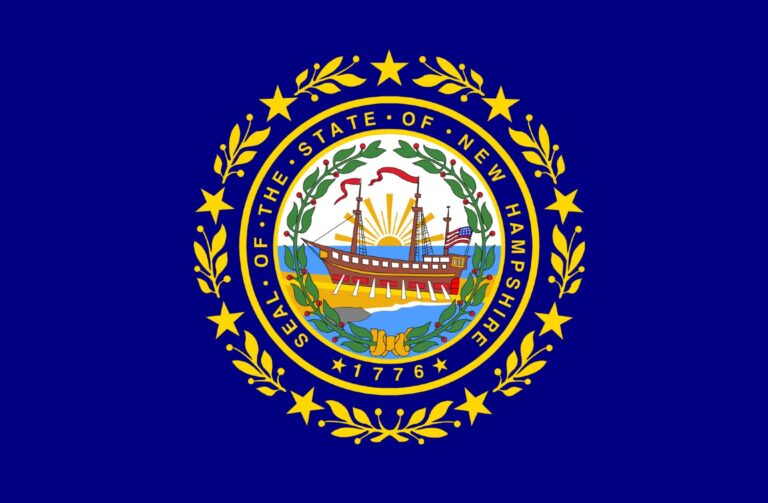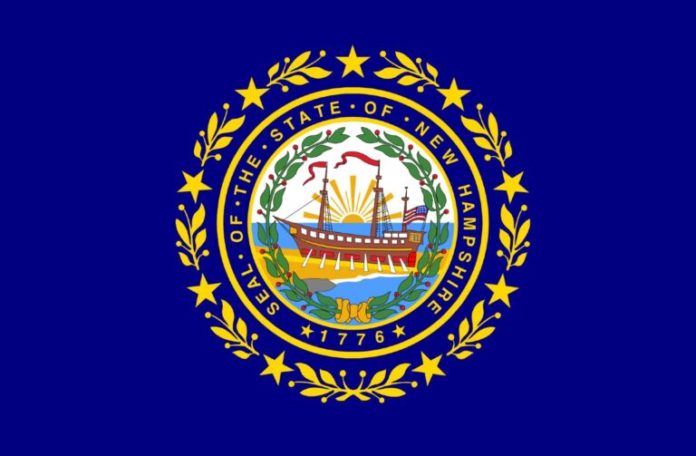Trespassing laws are fundamental to understanding both your own property rights and the property rights of other people.

Whether you want to know what you can do about people who are coming onto your land or near your home, or need to know exactly what the line is when you are out hunting or camping, studying your home state’s trespassing laws will tell you what you need to know.
But this is complicated by the fact that many states have laws that are not entirely easy to understand, and there is plenty of variation in the law and the punishments for breaking it throughout the nation.
New Hampshire’s laws are generally clear and to the point, but there are a few concepts you’ll need to be aware of, specifically the requirements for fencing or signage depending on what kind of property you’re trying to protect.
The rest of this article will tell you everything you need to know about New Hampshire trespassing laws…
New Hampshire Trespassing Law Overview
- Trespassing is typically a misdemeanor in New Hampshire, though repeated violations or any trespass that results in substantial damage can be charged as a felony.
- Fences or posted signage are generally required for maximum protection against trespassers in New Hampshire.
- New Hampshire has specific requirements for signage, particularly the spacing of signs around the perimeter of a property, at entrance points, and the size of the letters on the sign.
What Constitutes Trespassing in New Hampshire?
New Hampshire defines a criminal trespass simply as the entering or remaining in any place, premises, structure, or vehicle when the person doing so knows they are not licensed or privileged.
Trespassing in New Hampshire is typically a misdemeanor in all instances, however, subsequent offenses or any offense that results in damages to any property of another in excess of $1,500 can be charged as a felony.
Everything you need to know about the strict definition of criminal trespass in New Hampshire and all of the circumstances surrounding the same is found in 635:2 of the state statutes.
The most relevant parts are copied below for you to review:
635:2 Criminal Trespass
I. A person is guilty of criminal trespass if, knowing that he is not licensed or privileged to do so, he enters or remains in any place.
II. Criminal trespass is a misdemeanor for the first offense and a class B felony for any subsequent offense if the person knowingly or recklessly causes damage in excess of $1,500 to the value of the property of another.
III. Criminal trespass is a misdemeanor if:
(a) The trespass takes place in an occupied structure as defined in RSA 635:1, III; or
(b) The person knowingly enters or remains:
(1) In any secured premises;
(2) In any place in defiance of an order to leave or not to enter which was personally communicated to him by the owner or other authorized person; or
(3) In any place in defiance of any court order restraining him from entering such place so long as he has been properly notified of such order.
IV. All other criminal trespass is a violation.
V. In this section, “secured premises” means any place which is posted in a manner prescribed by law or in a manner reasonably likely to come to the attention of intruders, or which is fenced or otherwise enclosed in a manner designed to exclude intruders.
VI. In this section, “property,” “property of another,” and “value” shall be as defined in RSA 637:2, I, IV, and V, respectively.
…
Does New Hampshire Require “No Trespassing” Signs?
No, not in the strictest sense. New Hampshire does not require no-trespassing signage for the law to back up property owners against trespassers, posted signage, in accordance with the requirements for doing so, does it count as securing a property against trespassing in the same way that erecting a fence, wall or other barriers to entry does.
The charges for willfully trespassing upon posted land are significantly worse than trespassing on unposted land, so if you want maximum protection against trespassers, particularly if you were going to press charges, you’ll definitely want to post your land if you don’t put up a fence.
It is also worth noting that New Hampshire has a fairly specific set of requirements for posting this signage, everything from the size of the font and the specific wording to the spacing of signs around the perimeter, including conspicuously posting them at natural or man-made entry points.
See section 635:4 for all the details:
Section 635:4 – Prescribed Manner of Posting
635:4 Prescribed Manner of Posting. – A person may post his land to prohibit criminal trespass and physical activities by posting signs of durable material with any words describing the physical activity prohibited, such as “No Hunting or Trespassing”, printed with block letters no less than 2 inches in height, and with the name and address of the owner or lessee of such land. Such signs shall be posted not more than 100 yards apart on all sides and shall also be posted at gates, bars and commonly used entrances. This section shall not prevent any owner from adding to the language required by this section.
…
Is Fencing Required to Protect Property?
Again, not explicitly required but it does escalate the severity of trespassing charges if someone wantonly trespasses after circumventing or defeating fencing or other obstacles to entry.
Review 635:2 for the relevant information on fencing.
What Other Marks Indicate “No Trespassing”?
None. Unlike some other states that allow properties to be marked using orange or purple paint at strategic spots, in New Hampshire it is signage, fencing, or direct notification verbally or in writing of a would-be trespasser.
Although there are plenty of people who might know what these markings mean, they have no weight of law behind them in New Hampshire and should be used only for convenient indication and reference of property boundaries.
Can Solicitors Ignore “No Trespassing” Signs?
Generally not, though it is hardly uncommon in suburban areas.
In most states there is a provision that can protect against charges of trespassing if the person who entered the property did so seeking out the owner by the most direct route to obtaining permission.
A solicitor coming up to your door to knock on it and ask you if you have a few minutes to listen to their speech would probably be protected by such precedents in law.
That being said, solicitors may never circumvent a locked gate or fence to access your property.
Something to keep in mind if you want to keep your property quiet and free of annoyances!
Can Trespassing Result in Arrest in New Hampshire?
Yes, it definitely can. Unless trespassing is considered a simple violation with an associated fine for doing so, any misdemeanor or felony charge can and likely will result in arrest.
This is something to keep in mind if someone is trespassing on your property, but also if there’s any chance that you might accidentally trespass on someone else’s while traveling out in the world.
For this reason, it is imperative that you understand all the exemptions for doing so, and be doubly sure that you never stray onto someone else’s property no matter what you are doing.
Can You Take Someone to Court for Trespassing?
Yes, absolutely. Especially in such cases where damage has been done to your property or fencing or someone has egregiously violated your property rights, you can certainly haul them to court over it.
Special Instances of Trespassing in New Hampshire
New Hampshire has a surprising amount of specialized trespassing laws, but probably the most relevant for the average person is the fact that should you lose control of your livestock
If your sheep, goats, cattle, horses, pigs, chickens or any other domestic fowl get onto someone else’s property causing damage you can be charged with trespassing.
Read all about it in 635:3:
Section 635:3 – Trespassing Stock or Domestic Fowl
635:3 Trespassing Stock or Domestic Fowl. – If any person having the charge or custody of any sheep, goats, cattle, horses, swine, or domestic fowl shall knowingly, recklessly, or negligently suffer or permit the same to enter upon, pass over, or remain upon any improved or enclosed land of another without written permission of the owner, occupant, or his or her agent, and thereby injures the owner’s crops or property, the person shall be guilty of a violation. Complaints shall be made to law enforcement officials or local animal control officers who shall enforce the provisions of this section.


